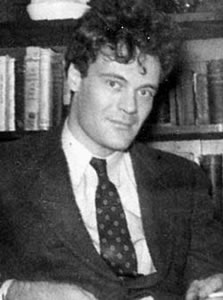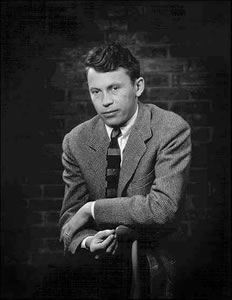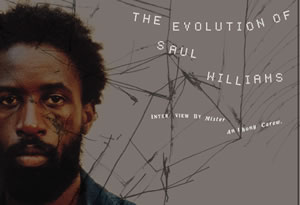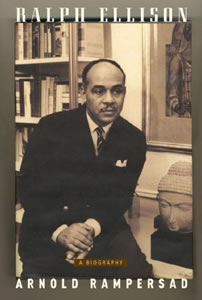De Amerikaanse dichter Robert Traill Spence Lowell werd geboren op 1 maart 1917 in Boston. Zie ook mijn blog van 1 maart 2007 en ook mijn blog van 28 februari 2008 en ook mijn blog van 1 maart 2009.
Waking in the Blue
The night attendant, a B.U. sophomore,
rouses from the mare’s-nest of his drowsy head
propped on The Meaning of Meaning.
He catwalks down our corridor.
Azure day
makes my agonized blue window bleaker.
Crows maunder on the petrified fairway.
Absence! My hearts grows tense
as though a harpoon were sparring for the kill.
(This is the house for the “mentally ill.”)
What use is my sense of humour?
I grin at Stanley, now sunk in his sixties,
once a Harvard all-American fullback,
(if such were possible!)
still hoarding the build of a boy in his twenties,
as he soaks, a ramrod
with a muscle of a seal
in his long tub,
vaguely urinous from the Victorian plumbing.
A kingly granite profile in a crimson gold-cap,
worn all day, all night,
he thinks only of his figure,
of slimming on sherbert and ginger ale–
more cut off from words than a seal.
This is the way day breaks in Bowditch Hall at McLean’s;
the hooded night lights bring out “Bobbie,”
Porcellian ’29,
a replica of Louis XVI
without the wig–
redolent and roly-poly as a sperm whale,
as he swashbuckles about in his birthday suit
and horses at chairs.
These victorious figures of bravado ossified young.
In between the limits of day,
hours and hours go by under the crew haircuts
and slightly too little nonsensical bachelor twinkle
of the Roman Catholic attendants.
(There are no Mayflower
screwballs in the Catholic Church.)
After a hearty New England breakfast,
I weigh two hundred pounds
this morning. Cock of the walk,
I strut in my turtle-necked French sailor’s jersey
before the metal shaving mirrors,
and see the shaky future grow familiar
in the pinched, indigenous faces
of these thoroughbred mental cases,
twice my age and half my weight.
We are all old-timers,
each of us holds a locked razor.

Robert Lowell (1 maart 1917 – 12 September 1977)
De Amerikaanse dichter Richard Wilbur werd geboren op 1 maart 1921 in New York. Zie ook mijn blog van 1 maart 2007 en ook mijn blog van 28 februari 2008 en ook mijn blog van 1 maart 2009.
Boy at the Window
Seeing the snowman standing all alone
In dusk and cold is more than he can bear.
The small boy weeps to hear the wind prepare
A night of gnashings and enormous moan.
His tearful sight can hardly reach to where
The pale-faced figure with bitumen eyes
Returns him such a God-forsaken stare
As outcast Adam gave to paradise.
The man of snow is, nonetheless, content,
Having no wish to go inside and die.
Still, he is moved to see the youngster cry.
Though frozen water is his element,
He melts enough to drop from one soft eye
A trickle of the purest rain, a tear
For the child at the bright pane surrounded by
Such warmth, such light, such love, and so much fear.
The Beautiful Changes
One wading a Fall meadow finds on all sides
The Queen Anne’s Lace lying like lilies
On water; it glides
So from the walker, it turns
Dry grass to a lake, as the slightest shade of you
Valleys my mind in fabulous blue Lucernes.
The beautiful changes as a forest is changed
By a chameleon’s tuning his skin to it;
As a mantis, arranged
On a green leaf, grows
Into it, makes the leaf leafier, and proves
Any greenness is greener than anyone knows.
Your hands hold roses always in a way that says
They are not only yours; the beautiful changes
In such kind ways,
Wishing ever to sunder
Things and Thing’s selves for a second finding, to lose
For a moment all that it touches back to wonder.

Richard Wilbur (New York, 1 maart 1921)
De Amerikaanse dichter, schrijver, acteur, rapper en musicus Saul Stacey Williams werd geboren in
Newburgh, New York op 29 februari 1972. Zie ook mijn blog van 28 februari 2008 en ook mijn blog van 1 maart 2009.
She (Fragment)
i presented
my feminine side
with flowers
she cut the stems
and placed them gently
down my throat
and these tu lips
might soon eclipse
your brightest hopes
***
she had nothing
but time on her hands:
silver rings, turquoise stones
and purple nails
i rubbed my thumb
across her palm:
a featherbed
where slept a psalm
yea, though i walk
i used to fly
and now we dance
i watched
my toenails blacken
and walked a deadened trance
until she woke me
with the knife edge
of her glance
i have the scars to prove
the clock strikes
with her hands

Saul Williams (Newburgh, 29 februari 1972)
De Afro-Amerikaanse schrijver Ralph (Waldo) Ellison werd geboren in Oklahoma City op 1 maart 1913. Zie ook mijn blog van 1 maart 2007 en ook mijn blog van 1 maart 2009.
Uit: Ralph Ellison (Biografie door Arnold Rampersad)
„Decades after the blazing hot afternoon in June 1933 when Ralph Ellison, in his first and last outing as a hobo, climbed fearfully and yet eagerly aboard a smoky freight train leaving Oklahoma City on a dangerous journey that he hoped would take him to college in Tuskegee, Alabama, his memories of growing up in Oklahoma continued both to haunt and to inspire him. For a long time he had suppressed those memories; then the time came when he began to crave them.
The turning point had been his triumph in 1952 with his novel Invisible Man. That success had led to a cascading flow of honors such as no other African-American writer had ever enjoyed. In 1953, he won the National Book Award, besting The Old Man and the Sea, by Ernest Hemingway, one of his idols. Later, the American Academy of Arts and Letters elected him a member, one of the fifty distinguished American men and women who formed its inner core. At the White House, first Lyndon B. Johnson and then Ronald Reagan awarded him presidential medals. At the behest of the novelist and critic André Malraux, another of his idols, France made him a Chevalier of the Order of Arts and Letters. The most venerable social club in America connected to the arts, the Century, in New York, elected him as its first black member. Harvard University, awarding him an honorary degree, offered him
a professorship. Never out of print and translated into more than twenty languages, Invisible Man maintains its reputation as one of the jewels of twentieth-century American fiction.
Ellison’s triumph in 1952 had also led to a tangled mess of fears and doubts about his ability to finish a second novel at least as fine as Invisible Man. By the time of his death in 1994, his failure to produce that second novel had made Ellison, a proud man, the butt of surreptitious jokes and cruel remarks. The snickering and giggling behind his back often left him prickly and tart, if not downright hostile. Clinging fearlessly and stubbornly to the ideal of harmonious racial integration in America, he found it hard to negotiate the treacherous currents of American life in the volatile 1960s and 1970s.“

Ralph Ellison (1 maart 1913 – 16 april 1994)
De Amerikaanse schrijver Steven Barnes werd geboren op 1 maart 1952 in Los Angeles. Zie ook mijn blog van 1 maart 2007 en ook mijn blog van 1 maart 2009.
Uit: Shadow Valley
„Summer’s warm rains had long since riven the earth, then dried again to dust. Three moons would wax and wane before the winter rivers swelled within their graveled banks.
Hot Tree had lived most of her adult life in Fire boma, the bamboowalled cluster of huts a day’s walk southeast of Great Sky. Now her hair was streaked with white, her brown skin deeply wrinkled, her breasts empty sacks. Years had cooled the fire in her dancing feet. She felt both hollow and heavy, and knew it would not be long before Father Mountain summoned her bones.
So much had changed in the past few moons.
For generations unknown the Ibandi had lived within the sheltering shadows of the mountains called Great Sky and Great Earth. The peaks were home to Father Mountain and Great Mother, whose timeless passion had birthed the world.
Three moons ago, Great Sky had exploded, the cataclysm wreathing the sky in stinking smoke and spewing rivers of boiling mud down its verdant slopes. Trees had been wrenched up by the roots, tumbling like dead brush. The Ibandi hunt chiefs had died. Some believed the god Himself had perished, but Hot Tree did not, though she well believed that the explosion was a sign of His displeasure with their wickedness.“

Steven Barnes (Los Angeles, 1 maart 1952)
